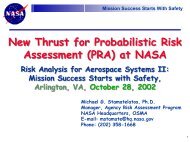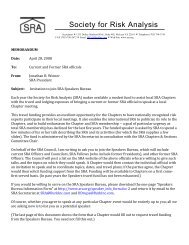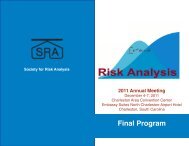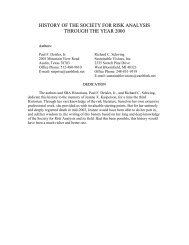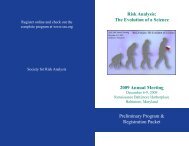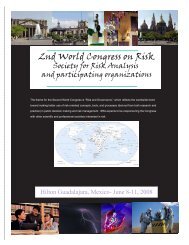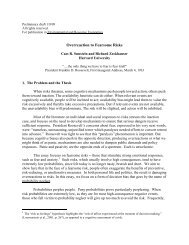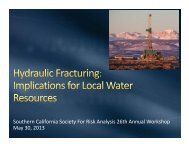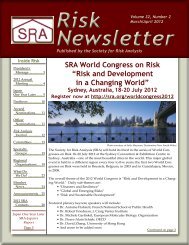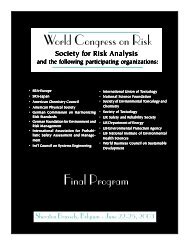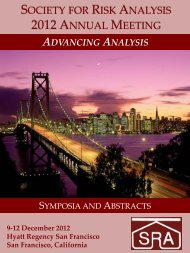Abstracts (PDF file, 1.8MB) - Society for Risk Analysis
Abstracts (PDF file, 1.8MB) - Society for Risk Analysis
Abstracts (PDF file, 1.8MB) - Society for Risk Analysis
You also want an ePaper? Increase the reach of your titles
YUMPU automatically turns print PDFs into web optimized ePapers that Google loves.
SRA 2013 Annual Meeting <strong>Abstracts</strong><br />
P.59 Henning, CC*; Overton, AJ; Marin, K; Cleland, JC; Turley,<br />
AT; ICF International; cara.henning@icfi.com<br />
DRAGON: A Single <strong>Risk</strong> Assessment Database to Promote<br />
Transparency and Data Sharing<br />
With the availability of large volumes of data <strong>for</strong> risk<br />
assessment and a greater emphasis on consistency and<br />
transparency in federal agencies, data management and data<br />
sharing are of keen interest <strong>for</strong> risk assessors. The DRAGON<br />
tool is a database that stores risk assessment data and allows<br />
nimble management of the overall assessment process. Within<br />
DRAGON, the risk assessors can implement systematic review<br />
of the literature, manage the assessment of the quality of key<br />
studies and store related decisions, manage the data entry<br />
process, per<strong>for</strong>m dose-response modeling, and rapidly generate<br />
reports in a variety of <strong>for</strong>mats. The database itself has a unified<br />
structure that allows data-sharing across agencies and risk<br />
assessors with similar interests in a given chemical. Data-entry<br />
<strong>for</strong>ms, reports, and assessment decision logic can be tailored<br />
<strong>for</strong> each agency, though, to meet the different internal<br />
priorities and needs. Included in the database is an evolving<br />
health outcome standard vocabulary that can be crosswalked to<br />
any other vocabulary if needed. The vocabulary is based on a<br />
system-based classification <strong>for</strong> each endpoint. Specific<br />
endpoints can also be mapped to custom categories <strong>for</strong> each<br />
assessment as desired. DRAGON also provides a framework <strong>for</strong><br />
coordinating the work of multiple people working on<br />
assessments of chemicals with large databases to improve<br />
consistency and to facilitate quality assurance procedures.<br />
M3-F.2 Henry, AD; Dietz, T*; University of Arizona;<br />
adhenry@email.arizona.edu<br />
Co-Evolution of Beliefs and Networks in Environmental<br />
<strong>Risk</strong> Policy: An Advocacy Coalition Framework Approach<br />
Effectively managing issues of environmental risk requires<br />
collaboration within policy networks. Within the environmental<br />
policy process, networks of in<strong>for</strong>mation sharing, resource<br />
exchange, and other <strong>for</strong>ms of interaction allow organizations to<br />
synthesize in<strong>for</strong>mation and work towards shared goals.<br />
Ultimately, this allows policy actors to collectively learn how to<br />
deal with complex, uncertain, and emerging risks. Despite the<br />
importance of policy networks, however, the <strong>for</strong>ces that shape<br />
these structures — and possible interventions to promote more<br />
effective networks — are not well understood. According to the<br />
Advocacy Coalition Framework, the dynamics of policy network<br />
<strong>for</strong>mation lead to structures exhibiting belief-oriented<br />
segregation—that is, a high correspondence between shared<br />
policy beliefs and voluntary collaborative relationships. These<br />
structures may be produced through at least two pathways:<br />
belief homophily, where actors actively seek out connections<br />
with others sharing their belief system, and organizational<br />
learning, where policy beliefs diffuse through collaborative ties<br />
between organizations involved in risk policy. The<br />
cross-sectional design of many policy network studies precludes<br />
an explicit examination of these potentially complementary<br />
<strong>for</strong>ces. This paper explicitly examines these dynamics using a<br />
reanalysis of data on policy beliefs and networking in U.S.<br />
environmental risk policy across two time periods, 1984 and<br />
2000 (N = 223). Results indicate strong homophily effects, but<br />
relatively weak learning effects, in the evolution of this policy<br />
network. This research helps pave the way <strong>for</strong> additional<br />
research on the dynamics that share policy networks and<br />
beliefs, and also helps to clarify the differences between<br />
individual versus organizational contributions to policy network<br />
evolution.<br />
M4-B.6 Henry, SH; Aungst, J*; Castoldi, AF; Rhomberg, L;<br />
Butterworth, J; Retired Food and Drug Administration, Food<br />
and Drug Admin., European Food Safety Authority, Gradient<br />
Corp., Science journalist/investigative reporter;<br />
sarahalehenry10@yahoo.com<br />
Panel Discussion <strong>for</strong> A new look at the toxicity of<br />
bisphenol A and public health policy<br />
This panel discussion moderated by Sara Henry and Jason<br />
Aungst will allow presenters to interact with each other and<br />
then with the audience on the symposium topic of the toxicity of<br />
bisphenol and public health policy.<br />
M4-B.5 Henry, SH; Aungst, J; Castoldi, AF; Rhomberg, L;<br />
Butterworth, T; Fitzpatrick, J*; Retired Food and Drug Admin.,<br />
Food and Drug Admin., European Food Safety Authority,<br />
Gradient Corp., Science journalist/investigative reporter,;<br />
sarahalehenry10@yahoo.com<br />
A new look at the toxicity of bisphenol A and public<br />
health policy making<br />
A question and answer session with the presenters of this<br />
symposium and the audience will follow the panel discussion.<br />
Session will be moderated by Sara Henry and Julie Fitzpatrick<br />
December 8-11, 2013 - Baltimore, MD



